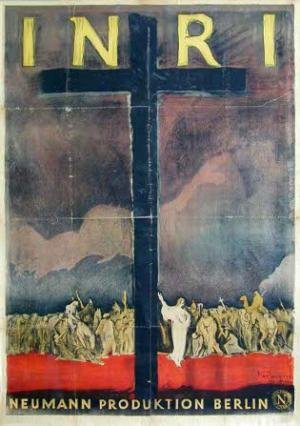Related Research Articles

Fear is a 1917 German silent horror film written and directed by Robert Wiene and starring Bruno Decarli, Conrad Veidt and Bernhard Goetzke.
The Wandering Light is a 1916 German silent drama film directed by Robert Wiene and starring Henny Porten, Bruno Decarli and Theodor Becker. It was based on a short story by Ernst von Wildenbruch. A Count marries a woman who come to wrongly believe that he is mad.

Bruno Decarli was a German stage and film actor.
The Marriage of Luise Rohrbach is a 1917 German silent drama film directed by Rudolf Biebrach and starring Henny Porten, Emil Jannings and Ludwig Trautmann. The film was based on a novel by Emmi Elert.
The Homecoming of Odysseus is a 1918 German silent comedy film directed by Rudolf Biebrach and starring Henny Porten, Bruno Decarli and Arthur Bergen.
Life Is a Dream is a 1917 German silent drama film directed by Robert Wiene and starring Emil Jannings, Bruno Decarli and Maria Fein. A young aristocrat meets a man and marries him, but soon discovers he is a monster. After his death she grows increasingly mad, until a revolutionary new cure is attempted which makes her believe that the whole episode was simply a dream.
Steadfast Benjamin is a 1917 German silent comedy film directed by Robert Wiene and starring Arnold Rieck, Guido Herzfeld and Martha Altenberg.

Frau Eva is a 1916 German silent drama film directed by Robert Wiene and starring Erna Morena, Emil Jannings and Theodor Loos. It was based on the 1874 novel Fromont and Risler by Alphonse Daudet. The film was Jannings' first starring role, his previous appearance having been as an extra in Im Schützengraben.
Playing with Fire is a 1921 German silent comedy-drama film directed by Georg Kroll and Robert Wiene and starring Diana Karenne, Vasilij Vronski, Ossip Runitsch, and Anton Edthofer. It was shot at the Babelsberg Studios in Berlin. The film received a generally positive reception from critics, although some were doubtful about the blending of farce and tragedy.
The Infernal Power is a 1922 German silent film directed by Robert Wiene and starring Thea Kasten, Emil Lind and Ossip Runitsch. The film is now a lost film, and virtually nothing is known of its plot or genre.
The Woman on the Rack is a 1928 German silent drama film directed by Robert Wiene and starring Lili Damita, Vladimir Gajdarov, and Johannes Riemann. It was also known by the alternative title A Scandal in Paris. It was based on a British play by Edward Hemmerde and Francis Neilson. The wife of a British aristocratic politician, who is neglected by her husband, resists an attempt to break them up. When her husband discovers what he mistakenly believes to be a dalliance with another man he begins divorce proceedings. Eventually the truth comes out and the couple reconcile. The film was not considered one of Wiene's greatest achievements, but he was praised for directing with his usual competence while Damita's performance as Lady Admaston was hailed.

The Night of Queen Isabeau is a 1920 German silent historical drama film directed by Robert Wiene and starring Fern Andra, Fritz Kortner, Hans Heinrich von Twardowski and Elsa Wagner. The film depicts the marriage between the mad Charles VI of France and his wife Queen Isabeau. It was shot at the Babelsberg Studios in Berlin. The film is now considered a lost film, but contemporary reviews praised Wiene's direction. The story revolves around insanity, a common theme in his films.
The Guardsman is a 1925 Austrian silent comedy film directed by Robert Wiene and starring Alfred Abel, María Corda and Anton Edthofer. The film was shot at the Schönbrunn Studios in Vienna. It was based on the play Testőr by Ferenc Molnár and in 1931 remade as a movie by Sidney Franklin.
Folly of Love is a 1928 German silent comedy film directed by Robert Wiene and starring Maria Jacobini, Jack Trevor and Betty Astor. While several of Wiene's previous films had met with mixed responses, Folly of Love was universally praised by critics. The film was made at the Marienfelde Studios of Terra Film. It was Wiene's last silent film. His next work was the 1930 sound film The Other.
The Power of Darkness is a 1924 German silent drama film directed by Conrad Wiene and starring Petr Sharov, Mariya Germanova and Maria Kryshanovskaya. It is an adaptation of Leo Tolstoy's play The Power of Darkness.

I.N.R.I. is a 1923 German silent religious epic film directed by Robert Wiene and starring Gregori Chmara, Henny Porten, and Asta Nielsen. The film is a retelling of the events leading up to the crucifixion of Jesus Christ. It was based on a 1905 novel by Peter Rosegger. It was reissued in 1933 in the United States with an added music track and narration as Crown of Thorns.

The Other is a 1930 German drama film directed by Robert Wiene and starring Fritz Kortner, Käthe von Nagy and Heinrich George. It was based on the 1893 play Der Andere by Paul Lindau. It was shot at the Terra Studios in Berlin. A French-language version The Prosecutor Hallers was shot by Wiene immediately afterwards in the same Berlin studio, but with different actors.
Roswolsky's Mistress is a 1921 German silent drama film directed by Felix Basch and starring Asta Nielsen, Paul Wegener, and Wilhelm Diegelmann. It was based on a novel by George Froeschel. The film was shot at the Tempelhof Studios in Berlin, with sets designed by art directors Robert Neppach and Jack Winter. According to one estimate, the star Asta Nielsen wore thirty six different costumes during the course of the film.

Emil Birron was a German stage and film actor.

The Ringwall Family is a 1918 German silent drama film directed by Rudolf Biebrach and starring Henny Porten, Bruno Decarli and Kurt Vespermann.
References
- ↑ Jung & Schatzberg p.40